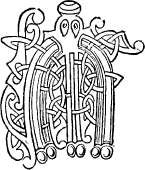
CHAPTER II.
Existing Remains of Irish Law

OST of the literary remains of ancient Ireland that are really valuable and characteristically beautiful appear to belong to the same distant period; and therefore they are highly interesting philologically, quite apart from the intrinsic beauty of some, which is very great. Of all those remains, those dealing with law are, considered as literature, the least attractive. But their value to the earnest student of antiquity is inferior to none, but is perhaps superior to all the rest, owing to their rigorously authentic character. The charge of having been produced or tinged by imagination cannot be made against the laws, rules, and customs which actually controlled the daily lives, conduct, and destinies of our ancestors, and under which they laboured, fought, played, and prayed, as occasion demanded. These remains at least represent what were once the realities of life: and the knowledge and the study of them must, with absolute certainty, help so far as they go to dispel the mist of years. We are brought if possible still closer to the actuality of individual life by the suits and judgments which are scattered through these laws for the purpose of illustrating their principles and their application.
And while one reads, if perchance his taste should be of wider scope, he is enabled to gather incidentally much archaeological information not strictly legal, but of a kind difficult if at all possible to glean from other sources, all stamped here with the authenticity of the law, and not less valuable for being thus given without design. The fact is as expressive as it is painful that, beyond the limited operations of one or two stunted societies, almost the whole of our Gaelic records, laws, and literature remained in manuscript, and practically inaccessible until the middle of the nineteenth century, and that much of those materials remain so even now at the close of the century. Most of those manuscript books, and some of the longer tracts, the legal as well as the others, refer to and quote from other and older books, sometimes by name, sometimes by a description which had become recognised as a name, as the White Book of such a person, the Black Book of such a place, the Yellow Book or the Speckled Book of So-and-so; and sometimes the reference is general, as to other versions or other books. From these references it is evident that, although we still possess a great deal of written matter as compared with other countries, far more than we possess has been lost. This is not wonderful in the circumstances of Ireland, but it is none the less matter for regret.
Still, competent judges say that our extant manuscript materials are, both for antiquity and intrinsic worth, treasures such as no nation north of the Alps can boast of. Any one who suspects this for a Gaelic exaggeration had better visit the Royal Irish Academy and have his incredulity speedily and agreeably cured by the evidence of his own eyes. Whatever else may be said of those remote ancestors of ours, it must be admitted that they were singularly devoted to literature, and if the remains of their work have a high value and interest for strangers and Teutons, to us whose heritage they are, and whose privilege and pride it is to call Ireland our native land, they should be not alone valuable and interesting, but sacred. A people possessing such precious monuments and indifferent to them would certainly be unworthy of the race and country that produced them, and would merit the censure of civilised mankind. Do we value these treasures as we ought? Do we escape the censure or fall under it? Apparently we fall under it; and this while we possess the power, and at heart the desire, to escape it. In practice we neglect what in theory we venerate; and thus, as in other respects, we perpetuate against ourselves as a nation a wrong begun by others.
